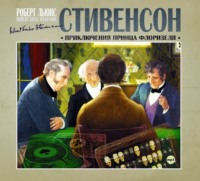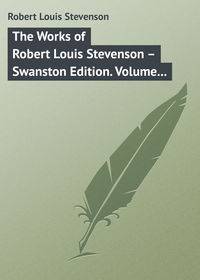 полная версия
полная версияThe Works of Robert Louis Stevenson – Swanston Edition. Volume 4
Armed with these reflections, he advanced boldly from his corner; but he had not taken above a couple of steps before a hand was laid upon his arm. He turned and beheld a lady cast in a very large mould and with somewhat stately features, but bearing no mark of severity in her looks.
“I see that you are a very self-confident lady-killer,” said she; “for you make yourself expected. But I was determined to meet you. When a woman has once so far forgotten herself as to make the first advance, she has long ago left behind her all considerations of petty pride.”
Silas was overwhelmed by the size and attractions of his correspondent and the suddenness with which she had fallen upon him. But she soon set him at his ease. She was very towardly and lenient in her behaviour; she led him on to make pleasantries, and then applauded him to the echo; and in a very short time, between blandishments and a liberal exhibition of warm brandy, she had not only induced him to fancy himself in love, but to declare his passion with the greatest vehemence.
“Alas!” she said; “I do not know whether I ought not to deplore this moment, great as is the pleasure you give me by your words. Hitherto I was alone to suffer; now, poor boy, there will be two. I am not my own mistress. I dare not ask you to visit me at my own house, for I am watched by jealous eyes. Let me see,” she added; “I am older than you, although so much weaker; and while I trust in your courage and determination, I must employ my own knowledge of the world for our mutual benefit. Where do you live?”
He told her that he lodged in a furnished hotel, and named the street and number.
She seemed to reflect for some minutes, with an effort of mind.
“I see,” she said at last. “You will be faithful and obedient, will you not?”
Silas assured her eagerly of his fidelity.
“To-morrow night, then,” she continued, with an encouraging smile, “you must remain at home all the evening; and if any friends should visit you, dismiss them at once on any pretext that most readily presents itself. Your door is probably shut by ten?” she asked.
“By eleven,” answered Silas.
“At a quarter past eleven,” pursued the lady, “leave the house. Merely cry for the door to be opened, and be sure you fall into no talk with the porter, as that might ruin everything. Go straight to the corner where the Luxembourg Gardens join the Boulevard; there you will find me waiting you. I trust you to follow my advice from point to point: and remember, if you fail me in only one particular, you will bring the sharpest trouble on a woman whose only fault is to have seen and loved you.”
“I cannot see the use of all these instructions,” said Silas.
“I believe you are already beginning to treat me as a master,” she cried, tapping him with her fan upon the arm. “Patience, patience! that should come in time. A woman loves to be obeyed at first, although afterwards she finds her pleasure in obeying. Do as I ask you, for Heaven’s sake, or I will answer for nothing. Indeed, now I think of it,” she added, with a manner of one who has just seen further into a difficulty, “I find a better plan of keeping importunate visitors away. Tell the porter to admit no one for you, except a person who may come that night to claim a debt; and speak with some feeling, as though you feared the interview, so that he may take your words in earnest.”
“I think you may trust me to protect myself against intruders,” he said, not without a little pique.
“That is how I should prefer the thing arranged,” she answered coldly. “I know you men; you think nothing of a woman’s reputation.”
Silas blushed and somewhat hung his head; for the scheme he had in view had involved a little vain-glorying before his acquaintances.
“Above all,” she added, “do not speak to the porter as you come out.”
“And why?” said he. “Of all your instructions, that seems to me the least important.”
“You at first doubted the wisdom of some of the others, which you now see to be very necessary,” she replied. “Believe me, this also has its uses; in time you will see them; and what am I to think of your affection, if you refuse me such trifles at our first interview?”
Silas confounded himself in explanations and apologies; in the middle of these she looked up at the clock and clapped her hands together with a suppressed scream.
“Heavens!” she cried, “is it so late? I have not an instant to lose. Alas, we poor women, what slaves we are! What have I not risked for you already?”
And after repeating her directions, which she artfully combined with caresses and the most abandoned looks, she bade him farewell and disappeared among the crowd.
The whole of the next day Silas was filled with a sense of great importance; he was now sure she was a countess; and when evening came he minutely obeyed her orders and was at the corner of the Luxembourg Gardens by the hour appointed. No one was there. He waited nearly half an hour, looking in the face of every one who passed or loitered near the spot; he even visited the neighbouring corners of the Boulevard and made a complete circuit of the garden railings; but there was no beautiful countess to throw herself into his arms. At last, and most reluctantly, he began to retrace his steps towards his hotel. On the way he remembered the words he had heard pass between Madame Zéphyrine and the blond young man, and they gave him an indefinite uneasiness.
“It appears,” he reflected, “that every one has to tell lies to our porter.”
He rang the bell, the door opened before him, and the porter in his bed-clothes came to offer him a light.
“Has he gone?” inquired the porter.
“He? Whom do you mean?” asked Silas, somewhat sharply, for he was irritated by his disappointment.
“I did not notice him go out,” continued the porter, “but I trust you paid him. We do not care, in this house, to have lodgers who cannot meet their liabilities.”
“What the devil do you mean?” demanded Silas, rudely. “I cannot understand a word of this farrago.”
“The short, blond young man who came for his debt,” returned the other. “Him it is I mean. Who else should it be, when I had your orders to admit no one else?”
“Why, good God! of course he never came,” retorted Silas.
“I believe what I believe,” returned the porter, putting his tongue into his cheek with a most roguish air.
“You are an insolent scoundrel,” cried Silas, and, feeling that he had made a ridiculous exhibition of asperity, and at the same time bewildered by a dozen alarms, he turned and began to run upstairs.
“Do you not want a light, then?” cried the porter.
But Silas only hurried the faster, and did not pause until he had reached the seventh landing and stood in front of his own door. There he waited a moment to recover his breath, assailed by the worst forebodings, and almost dreading to enter the room.
When at last he did so he was relieved to find it dark, and to all appearance untenanted. He drew a long breath. Here he was, home again in safety, and this should be his last folly as certainly as it had been his first. The matches stood on a little table by the bed, and he began to grope his way in that direction. As he moved, his apprehensions grew upon him once more, and he was pleased, when his foot encountered an obstacle, to find it nothing more alarming than a chair. At last he touched curtains. From the position of the window, which was faintly visible, he knew he must be at the foot of the bed, and had only to feel his way along it in order to reach the table in question.
He lowered his hand, but what it touched was not simply a counterpane – it was a counterpane with something underneath it like the outline of a human leg. Silas withdrew his arm and stood a moment petrified.
“What, what,” he thought, “can this betoken?”
He listened intently, but there was no sound of breathing. Once more, with a great effort, he reached out the end of his finger to the spot he had already touched; but this time he leaped back half a yard, and stood shivering and fixed with terror. There was something in his bed. What it was he knew not, but there was something there.
It was some seconds before he could move. Then, guided by an instinct, he fell straight upon the matches, and, keeping his back towards the bed, lighted a candle. As soon as the flame had kindled, he turned slowly round and looked for what he feared to see. Sure enough, there was the worst of his imaginations realised. The coverlid was drawn carefully up over the pillow, but it moulded the outline of a human body lying motionless; and when he dashed forward and flung aside the sheets, he beheld the blond young man whom he had seen in the Bullier Ball the night before, his eyes open and without speculation, his face swollen and blackened, and a thin stream of blood trickling from his nostrils.
Silas uttered a long, tremulous wail, dropped the candle and fell on his knees beside the bed.
Silas was awakened from the stupor into which his terrible discovery had plunged him, by a prolonged but discreet tapping at the door. It took him some seconds to remember his position; and when he hastened to prevent any one from entering it was already too late. Dr. Noel, in a tall nightcap, carrying a lamp which lighted up his long white countenance, sidling in his gait, and peering and cocking his head like some sort of bird, pushed the door slowly open, and advanced into the middle of the room.
“I thought I heard a cry,” began the Doctor, “and fearing you might be unwell I did not hesitate to offer this intrusion.”
Silas, with a flushed face and a fearful beating heart, kept between the Doctor and the bed; but he found no voice to answer.
“You are in the dark,” pursued the Doctor; “and yet you have not even begun to prepare for rest. You will not easily persuade me against my own eyesight; and your face declares most eloquently that you require either a friend or a physician – which is it to be? Let me feel your pulse, for that is often a just reporter of the heart.”
He advanced to Silas, who still retreated before him backwards, and sought to take him by the wrist; but the strain on the young American’s nerves had become too great for endurance. He avoided the Doctor with a febrile movement, and, throwing himself upon the floor, burst into a flood of weeping.
As soon as Dr. Noel perceived the dead man in the bed his face darkened; and hurrying back to the door, which he had left ajar, he hastily closed and double-locked it.
“Up!” he cried, addressing Silas in strident tones; “this is no time for weeping. What have you done? How came this body in your room? Speak freely to one who may be helpful. Do you imagine I would ruin you? Do you think this piece of dead flesh on your pillow can alter in any degree the sympathy with which you have inspired me? Credulous youth, the horror with which blind and unjust law regards an action never attaches to the doer in the eyes of those who love him; and if I saw the friend of my heart return to me out of seas of blood he would be in no way changed in my affection. Raise yourself,” he said; “good and ill are a chimera; there is nought in life except destiny, and however you may be circumstanced there is one at your side who will help you to the last.”
Thus encouraged, Silas gathered himself together, and in a broken voice, and helped out by the Doctor’s interrogations, contrived at last to put him in possession of the facts. But the conversation between the Prince and Geraldine he altogether omitted, as he had understood little of its purport, and had no idea that it was in any way related to his own misadventure.
“Alas!” cried Dr. Noel, “I am much abused, or you have fallen innocently into the most dangerous hands in Europe. Poor boy, what a pit has been dug for your simplicity! into what a deadly peril have your unwary feet been conducted! This man,” he said, “this Englishman, whom you twice saw, and whom I suspect to be the soul of the contrivance, can you describe him? Was he young or old? tall or short?”
But Silas, who, for all his curiosity, had not a seeing eye in his head, was able to supply nothing but meagre generalities, which it was impossible to recognise.
“I would have it a piece of education in all schools!” cried the Doctor angrily. “Where is the use of eyesight and articulate speech if a man cannot observe and recollect the features of his enemy? I, who know all the gangs of Europe, might have identified him, and gained new weapons for your defence. Cultivate this art in future, my poor boy; you may find it of momentous service.”
“The future!” repeated Silas. “What future is there left for me except the gallows?”
“Youth is but a cowardly season,” returned the Doctor; “and a man’s own troubles look blacker than they are. I am old, and yet I never despair.”
“Can I tell such a story to the police?” demanded Silas.
“Assuredly not,” replied the Doctor. “From what I see already of the machination in which you have been involved, your case is desperate upon that side; and for the narrow eye of the authorities you are infallibly the guilty person. And remember that we only know a portion of the plot; and the same infamous contrivers have doubtless arranged many other circumstances which would be elicited by a police inquiry, and help to fix the guilt more certainly upon your innocence.”
“I am then lost, indeed!” cried Silas.
“I have not said so,” answered Dr. Noel, “for I am a cautious man.”
“But look at this!” objected Silas, pointing to the body. “Here is this object in my bed: not to be explained, not to be disposed of, not to be regarded without horror.”
“Horror?” replied the Doctor. “No. When this sort of clock has run down, it is no more to me than an ingenious piece of mechanism, to be investigated with the bistoury. When blood is once cold and stagnant, it is no longer human blood; when flesh is once dead, it is no longer that flesh which we desire in our lovers and respect in our friends. The grace, the attraction, the terror, have all gone from it with the animating spirit. Accustom yourself to look upon it with composure; for if my scheme is practicable you will have to live some days in constant proximity to that which now so greatly horrifies you.”
“Your scheme?” cried Silas. “What is that? Tell me speedily, Doctor; for I have scarcely courage enough to continue to exist.”
Without replying, Dr. Noel turned towards the bed, and proceeded to examine the corpse.
“Quite dead,” he murmured. “Yes, as I had supposed, the pockets empty. Yes, and the name cut off the shirt. Their work has been done thoroughly and well. Fortunately, he is of small stature.”
Silas followed these words with an extreme anxiety. At last the Doctor, his autopsy completed, took a chair and addressed the young American with a smile.
“Since I came into your room,” said he, “although my ears and my tongue have been so busy, I have not suffered my eyes to remain idle. I noted a little while ago that you have there, in the corner, one of those monstrous constructions which your fellow-countrymen carry with them into all quarters of the globe – in a word, a Saratoga trunk. Until this moment I have never been able to conceive the utility of these erections; but then I began to have a glimmer. Whether it was for convenience in the slave-trade, or to obviate the results of too ready an employment of the bowie-knife, I cannot bring myself to decide. But one thing I see plainly – the object of such a box is to contain a human body.”
“Surely,” cried Silas, “surely this is not a time for jesting.”
“Although I may express myself with some degree of pleasantry,” replied the Doctor, “the purport of my words is entirely serious. And the first thing we have to do, my young friend, is to empty your coffer of all that it contains.”
Silas, obeying the authority of Dr. Noel, put himself at his disposition. The Saratoga trunk was soon gutted of its contents, which made a considerable litter on the floor; and then – Silas taking the heels and the Doctor supporting the shoulders – the body of the murdered man was carried from the bed, and, after some difficulty, doubled up and inserted whole into the empty box. With an effort on the part of both, the lid was forced down upon this unusual baggage, and the trunk was locked and corded by the Doctor’s own hand, while Silas disposed of what had been taken out between the closet and a chest of drawers.
“Now,” said the Doctor, “the first step has been taken on the way to your deliverance. To-morrow, or rather to-day, it must be your task to allay the suspicions of your porter, paying him all that you owe; while you may trust me to make the arrangements necessary to a safe conclusion. Meantime, follow me to my room, where I shall give you a safe and powerful opiate; for, whatever you do, you must have rest.”
The next day was the longest in Silas’s memory; it seemed as if it would never be done. He denied himself to his friends, and sat in a corner with his eyes fixed upon the Saratoga trunk in dismal contemplation. His own former indiscretions were now returned upon him in kind; for the observatory had been once more opened, and he was conscious of an almost continual study from Madame Zéphyrine’s apartment. So distressing did this become that he was at last obliged to block up the spy-hole from his own side; and when he was thus secured from observation he spent a considerable portion of his time in contrite tears and prayer.
Late in the evening Dr. Noel entered the room carrying in his hand a pair of sealed envelopes without address, one somewhat bulky, and the other so slim as to seem without enclosure.
“Silas,” he said, seating himself at the table, “the time has now come for me to explain my plan for your salvation. To-morrow morning, at an early hour, Prince Florizel of Bohemia returns to London, after having diverted himself for a few days with the Parisian Carnival. It was my fortune, a good while ago, to do Colonel Geraldine, his Master of the Horse, one of those services, so common in my profession, which are never forgotten upon either side. I have no need to explain to you the nature of the obligation under which he was laid; suffice it to say that I knew him ready to serve me in any practicable manner. Now, it was necessary for you to gain London with your trunk unopened. To this the Custom House seemed to oppose a fatal difficulty; but I bethought me that the baggage of so considerable a person as the Prince is, as a matter of courtesy, passed without examination by the officers of Custom. I applied to Colonel Geraldine, and succeeded in obtaining a favourable answer. To-morrow, if you go before six to the hotel where the Prince lodges, your baggage will be passed over as a part of his, and you yourself will make the journey as a member of his suite.”
“It seems to me, as you speak, that I have already seen both the Prince and Colonel Geraldine; I even overheard some of their conversation the other evening at the Bullier Ball.”
“It is probable enough; for the Prince loves to mix with all societies,” replied the Doctor. “Once arrived in London,” he pursued, “your task is nearly ended. In this more bulky envelope I have given you a letter which I dare not address; but in the other you will find the designation of the house to which you must carry it along with your box, which will there be taken from you and not trouble you any more.”
“Alas!” said Silas, “I have every wish to believe you; but how is it possible? You open up to me a bright prospect, but, I ask you, is my mind capable of receiving so unlikely a solution? Be more generous, and let me further understand your meaning.”
The Doctor seemed painfully impressed.
“Boy,” he answered, “you do not know how hard a thing you ask of me. But be it so. I am now inured to humiliation; and it would be strange if I refused you this, after having granted you so much. Know, then, that although I now make so quiet an appearance – frugal, solitary, addicted to study – when I was younger, my name was once a rallying-cry among the most astute and dangerous spirits of London; and while I was outwardly an object for respect and consideration, my true power resided in the most secret, terrible, and criminal relations. It is to one of the persons who then obeyed me that I now address myself to deliver you from your burden. They were men of many different nations and dexterities, all bound together by a formidable oath, and working to the same purposes; the trade of the association was in murder; and I who speak to you, innocent as I appear, was the chieftain of this redoubtable crew.”
“What?” cried Silas. “A murderer? And one with whom murder was a trade? Can I take your hand? Ought I so much as to accept your services? Dark and criminal old man, would you make an accomplice of my youth and my distress?”
The Doctor bitterly laughed.
“You are difficult to please, Mr. Scuddamore,” said he; “but I now offer you your choice of company between the murdered man and the murderer. If your conscience is too nice to accept my aid, say so, and I will immediately leave you. Thenceforward you can deal with your trunk and its belongings as best suits your upright conscience.”
“I own myself wrong,” replied Silas. “I should have remembered how generously you offered to shield me, even before I had convinced you of my innocence, and I continue to listen to your counsels with gratitude.”
“That is well,” returned the Doctor; “and I perceive you are beginning to learn some of the lessons of experience.”
“At the same time,” resumed the New Englander, “as you confess yourself accustomed to this tragical business, and the people to whom you recommend me are your own former associates and friends, could you not yourself undertake the transport of the box, and rid me at once of its detested presence?”
“Upon my word,” replied the Doctor, “I admire you cordially. If you do not think I have already meddled sufficiently in your concerns, believe me, from my heart I think the contrary. Take or leave my services as I offer them; and trouble me with no more words of gratitude, for I value your consideration even more lightly than I do your intellect. A time will come, if you should be spared to see a number of years in health of mind, when you will think differently of all this, and blush for your to-night’s behaviour.”
So saying, the Doctor arose from his chair, repeated his directions briefly and clearly, and departed from the room without permitting Silas any time to answer.
The next morning Silas presented himself at the hotel, where he was politely received by Colonel Geraldine, and relieved, from that moment, of all immediate alarm about his trunk and its grisly contents. The journey passed over without much incident, although the young man was horrified to overhear the sailors and railway porters complaining among themselves about the unusual weight of the Prince’s baggage. Silas travelled in a carriage with the valets, for Prince Florizel chose to be alone with his Master of the Horse. On board the steamer, however, Silas attracted his Highness’s attention by the melancholy of his air and attitude as he stood gazing at the pile of baggage; for he was still full of disquietude about the future.
“There is a young man,” observed the Prince, “who must have some cause for sorrow.”
“That,” replied Geraldine, “is the American for whom I obtained permission to travel with your suite.”
“You remind me that I have been remiss in courtesy,” said Prince Florizel, and advancing to Silas, he addressed him with the most exquisite condescension in these words:
“I was charmed, young sir, to be able to gratify the desire you made known to me through Colonel Geraldine. Remember, if you please, that I shall be glad at any future time to lay you under a more serious obligation.”
And he then put some questions as to the political condition of America, which Silas answered with sense and propriety.
“You are still a young man,” said the Prince; “but I observe you to be very serious for your years. Perhaps you allow your attention to be too much occupied with grave studies. But, perhaps, on the other hand, I am myself indiscreet and touch upon a painful subject.”
“I have certainly cause to be the most miserable of men,” said Silas; “never has a more innocent person been more dismally abused.”
“I will not ask you for your confidence,” returned Prince Florizel. “But do not forget that Colonel Geraldine’s recommendation is an unfailing passport; and that I am not only willing, but possibly more able than many others, to do you a service.”









